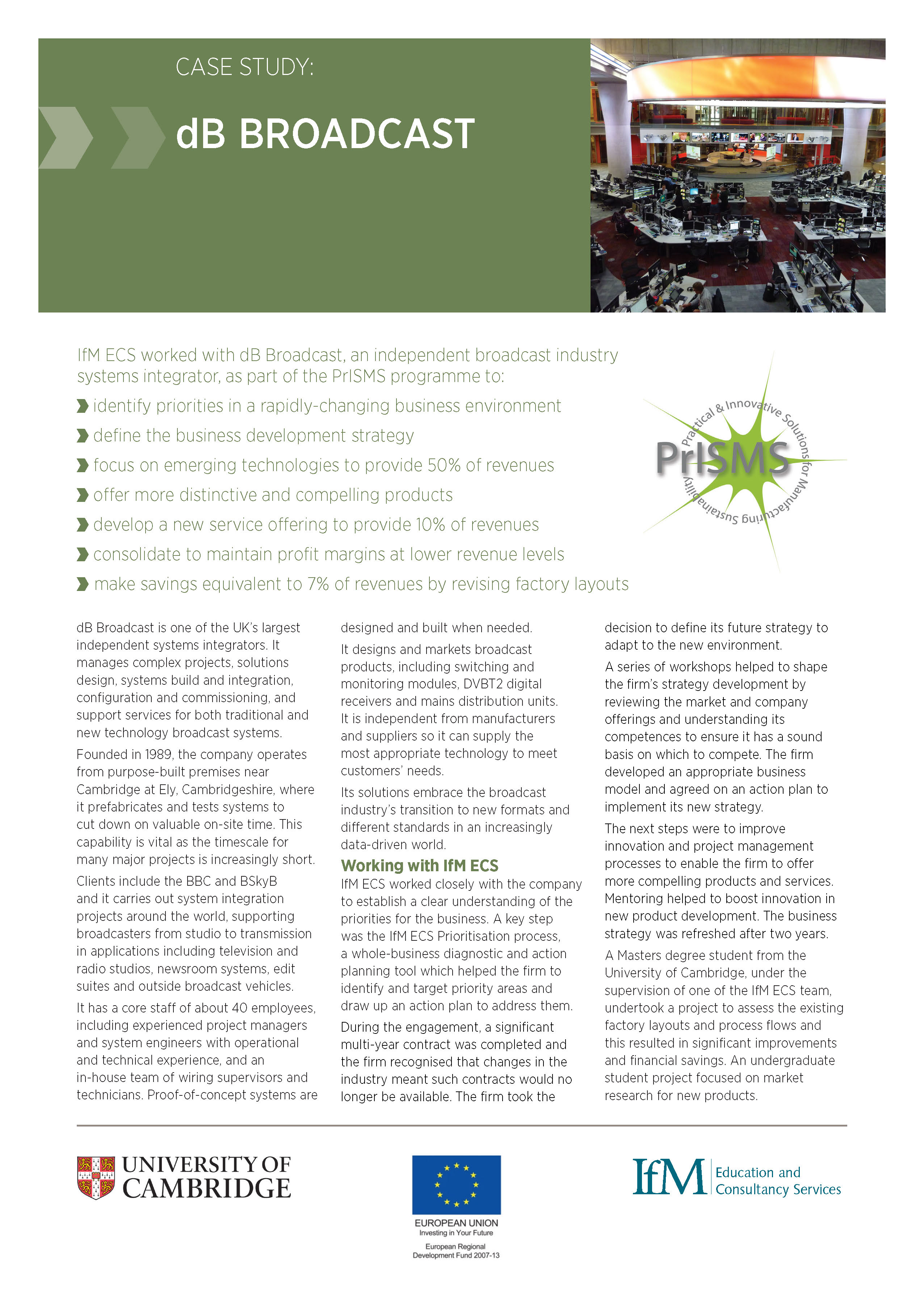dB Broadcast: delivering broadcast system integration from studio to transmission worldwide

dB Broadcast is one of more than 100 smaller manufacturers that IfM ECS is working with as part of the PrISMS programme – and this case study highlights the difference it has made. The company is one of the UK’s largest independent systems integrators and it delivers a wide range of services to broadcasters from studio to transmission. It builds, integrates and commissions systems and support services for traditional and new technology broadcast systems.
IfM ECS worked with dB Broadcast as part of the PrISMS programme to:
|
identify priorities in a rapidly-changing business environment |
|
|
define the business development strategy |
|
|
focus on emerging technologies to provide 50% of revenues |
|
|
offer more distinctive and compelling products |
|
|
develop a new service offering to provide 10% of revenues |
|
|
consolidate to maintain profit margins at lower revenue levels |
|
|
make savings equivalent to 7% of revenues by revising factory layouts. |
dB Broadcast is one of the UK’s largest independent systems integrators. It manages complex projects, solutions design, systems build and integration, configuration and commissioning, and support services for both traditional and new technology broadcast systems.
Founded in 1989, the company operates from purpose-built premises near Cambridge at Ely, Cambridgeshire, where it prefabricates and tests systems to cut down on valuable on-site time. This capability is vital as the timescale for many major projects is increasingly short.
Clients include the BBC and BSkyB and it carries out system integration projects around the world, supporting broadcasters from studio to transmission in applications including television and radio studios, newsroom systems, edit suites and outside broadcast vehicles.
It has a core staff of about 40 employees, including experienced project managers and system engineers with operational and technical experience, and an in-house team of wiring supervisors and technicians. Proof-of-concept systems are designed and built when needed.
It designs and markets broadcast products, including switching and monitoring modules, DVBT2 digital receivers and mains distribution units. It is independent from manufacturers and suppliers so it can supply the most appropriate technology to meet customers’ needs.
Its solutions embrace the broadcast industry’s transition to new formats and different standards in an increasingly data-driven world.

Working with IfM ECS
IfM ECS worked closely with the company to establish a clear understanding of the priorities for the business. A key step was the IfM ECS Prioritisation process, a whole-business diagnostic and action planning tool which helped the firm to identify and target priority areas and draw up an action plan to address them.
During the engagement, a significant multi-year contract was completed and the firm recognised that changes in the industry meant such contracts would no longer be available. The firm took the decision to define its future strategy to adapt to the new environment.
A series of workshops helped to shape the firm’s strategy development by reviewing the market and company offerings and understanding its competences to ensure it has a sound basis on which to compete. The firm developed an appropriate business model and agreed on an action plan to implement its new strategy.
The next steps were to improve innovation and project management processes to enable the firm to offer more compelling products and services. Mentoring helped to boost innovation in new product development. The business strategy was refreshed after two years.
A Masters degree student from the University of Cambridge, under the supervision of one of the IfM ECS team, undertook a project to assess the existing factory layouts and process flows and this resulted in significant improvements and financial savings. An undergraduate student project focused on market research for new products.
New strategy for a changing market
IfM ECS worked closely with the firm to help develop its future business strategy for a rapidly-changing business environment. The results brought about by these interventions are detailed below.
|
Prioritisation: The board has prioritised the company’s key challenges and formulated an action plan to address them |
|
|
Business strategy development: The firm’s existing situation was reviewed to identify opportunities, understand its competences and explore potential markets. The firm developed an appropriate business model, identified the capabilities to be developed and developed an action plan to implement the new business strategy. This strategy was refreshed after two years |
|
|
New service offering: Arising from the strategy development, a new service offering was developed and this now accounts for 10% of company revenues |
|
|
Innovation development: Idea generation, product introduction and product portfolio management assistance helped the firm to offer more distinctive and compelling products and services |
|
|
Increased knowledge of new technologies: The firm has worked more closely with companies in its supply chain to increase its knowledge of their technologies, understand their capabilities and enhance dB Broadcast’s offering as a systems integrator |
|
|
Focus on emerging technologies: New technologies previously accounted for about 25% of revenues and this has been increased to 50% |
|
|
Maintain profit margins: The completion of a multi-year contract during the engagement with IfM ECS led to a reduction in turnover. Efficiency measures were implemented to considerably reduce overheads, mainly in infrastructure, and these helped the firm maintain its profit margins |
|
|
Improved factory layout: A supervised student project helped to identify significant potential improvements to the factory layout and work processes, reducing the number of factory units from three to two and leading to a saving equivalent to 7% of revenue |
|
|
Sustainability: Reorganising the factory units and layouts has resulted in reduced energy consumption |
|
|
Maintain core staff: Key staff have been retained, despite cost reductions, and upskilled. Contractors are used during peaks in the workload. |
David Bird, managing director, said: “Companies such as dB need to be flexible and ready to adapt because it is in an industry that is currently transitioning to new formats, converging with IT technology and customers have an expectation of lower prices.
“And in this fast changing market, IfM ECS has been instrumental in helping dB Broadcast identify target services and products that have enabled the company to set a clear business plan.”
For more on dB Broadcast visit www.dbbroadcast.co.uk.
|
PrISMS The PrISMS (Practical & Innovative Solutions for Manufacturing Sustainability) programme aims to transform the growth prospects of 50 start-ups and 70 smaller manufacturers across the Eastern Region – creating more than 140 new jobs and safeguarding many more. The programme is funded by the European Regional Development Fund (ERDF), with match funding from the EPSRC Centre for Innovative Manufacturing in Industrial Sustainability, ideaSpace and IfM Education and Consultancy Services (IfM ECS) and supported by 11 county and district councils in the region. It is managed and delivered by IfM ECS, which bases its methods on research at the University of Cambridge’s Institute for Manufacturing (IfM). For more information visit here. |
|
IfM ECS IfM Education and Consultancy Services works with companies of all sizes to help create and capture value and with national and regional governments to support and grow their industrial sectors. It does this by transferring the new ideas and approaches developed by researchers at the Institute for Manufacturing (IfM) through a programme of education and consultancy services. IfM ECS is owned by the University of Cambridge. Its profits are gifted to the University to fund future research activities. For more details on its work with SMEs visit here. |
|
ERDF PrISMS is part-financed by the East of England European Regional Development Fund (ERDF) Programme 2007-2013. The Department for Communities and Local Government is the managing authority for ERDF in England, which is one of the funds established by the European Commission to help local areas stimulate their local development by investing in projects which will support local businesses and create jobs. The East of England ERDF programme (covering Bedfordshire, Cambridgeshire, Essex, Hertfordshire, Norfolk and Suffolk) supports low carbon economic growth and has allocated approximately €95 million. |
Download the case study here.
For further information about the work of IfM ECS in the PrISMS programme please contact contact Nicky Athanassopoulou on +44 (0)1223 760376 or naa14@cam.ac.uk; or John McManus on +44 (0) 1223 764908 or jm694@cam.ac.uk.










